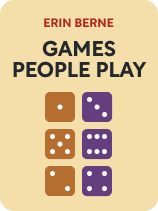

This article is an excerpt from the Shortform book guide to "Games People Play" by Eric Berne. Shortform has the world's best summaries and analyses of books you should be reading.
Like this article? Sign up for a free trial here .
What is Eric Berne’s Games People Play about? Why does Berne mean by “games” in the context of social interaction?
In his book Games People Play, Dr. Eric Berne says that mind games go back to childhood. Children learn mind games from their parents and then use them later in life. There are often patterns associated with these games that are so deeply ingrained that the player often doesn’t realize what they’re doing.
Here’s a brief overview of Games People Play: The Psychology of Human Relationships by Dr. Eric Berne.
Games Originate in Childhood
In his book Games People Play: The Psychology of Human Relationships, Dr. Eric Berne argues that games are passed down from parents to their children. This is usually unconscious. Most parents consciously teach operations, rituals, and small talk (for example, table manners), but children naturally absorb games, whether they know it or not.h
According to Berne, a family’s games are the emotional environment they create. In other words, there are “currents” or patterns of emotion that repeat in a given household. These are the emotions of their games—think of Mr. Vesuvius, or similar narcissistic parental archetypes.
A child then picks up on how her family expresses emotions. She learns to play the same games by unconsciously imitating her parents, Berne says. Then, children start to deliberately initiate games in order to learn how they work. Little Vesuvius blows up at her brother, experiences the payoff, and thus learns the game.
By the time we’ve grown up, most of us have forgotten the games we learned to play. But because they come from childhood, Berne argues, we should consider the games we played as children to better understand the games we play as adults.
(Shortform note: Children do learn from what we do, and not just what we say. But it’s possible to raise emotionally intelligent kids—it boils down to being an emotionally mature parent, so that your kids model on that effective behavior. If a kid grows up in a game-free family, then perhaps they can skip games altogether. Yet most of us didn’t have that experience, and in that case, Family Systems Therapy can help. FST helps family members to express feelings, uncover old traumas, and heal from unhealthy coping mechanisms. This is an established, evidence-based approach to changing old patterns of thought and feeling that, if ignored, will continue to influence your behavior.)
How Games Work
Now, let’s clarify how games work. To clear up Berne’s clinical jargon, we’ve distilled out the basic pattern that games follow. Below we’ll explore their main characteristics.
You Play a Game From a “Position”
As we covered in our section on pastimes, a “position” is an unconscious, deeply held belief. If you hold the belief that “life is basically pointless,” you’ll behave in ways that reflect that belief, according to Berne. (Again, we’ll call these stances.)
You play any game in accord with such an underlying belief. It gives rise to a hidden motive, and that causes you to seek situations that reinforce the belief.
For example, the above belief might yield a game where Player A is always apathetic or depressed. A family member or friend tries to cheer him up, but Player A cynically refuses—“Don’t bother trying; are you even happy yourself?” His stagnant energy makes those around him less cheerful, “proving” to himself that “life is pointless, no one is happy anyway.”
(Shortform note: Dysfunctional relationship habits don’t necessarily come from just beliefs. For example, Mr. Vesuvius’ angry outbursts may come from brain trauma earlier in life. Berne also doesn’t account for the fact that genetic influences often underlie addictive patterns. All the same, the best way forward is often to focus on what we can control. When something is out of our control, like a genetic susceptibility to mental illness, our options are internal: Embrace your life’s difficulties, develop resilience, and be resourceful—which may mean reshaping your psychology despite physiological problems like, for example, repeated concussions from long years of football.)
The Basic Pattern of a Game
Though Berne doesn’t make it clear, we can infer that the basic pattern of a game goes as follows:
- Player A holds some unconscious belief, and it gives them a hidden motive. Neither they nor the other players are aware of this motive. In general, the motive is to create an outcome that reinforces their belief.
- Working from this belief, Player A tries to cause Player B to behave how they want. What A wants is for B to play into their game and prove their belief.
- Player B typically responds by falling for the game. There may be some back-and-forth (remember deceptive exchanges), and B ends up proving A’s belief.
- Player A now feels some kind of self-righteous validation. Their belief has been reinforced; A got the outcome they wanted.
On the other side, Player B plays their own game (remember that people play games that complement one another). A’s game also works to prove B’s, such that game players often help each other to keep playing.
Say Player A is complaining about an annoying coworker to gain validation, and Player B flares up—“God, can’t you stop being so negative for one day?” Here, Player A’s game of “I Can’t Believe Them” complements Player B’s game of “Toxic Positivity”; they mutually enable each other.
“It’s Just Too Hard”
Let’s illustrate the basic pattern with a simple game. “It’s Just Too Hard” occurs when Player A doesn’t want to do anything effortful, so he manipulates Player B into relieving him of responsibility.
Player A’s motivating force: an unconscious belief like, “I’m entitled to avoid responsibility.” The game goes like this:
- Player B (typically A’s partner) asks Player A to perform some responsibility, like doing the laundry. Reluctantly he does so but does a shoddy job.
- Player B returns and notices that A did a poor job—her whites have been ruined because A didn’t separate out the darks.
- Angry, B confronts A about this. A argues that he doesn’t really know how to do laundry, so she shouldn’t have asked him. She should just do it herself.
- With no good alternative, B relieves A of the responsibility. She’ll do it herself, because he can’t be relied on.
- Player A has succeeded in avoiding responsibility, reinforcing his stance. Unconsciously, he now feels even more entitled.
(Shortform note: This is a real pattern that many women report experiencing (not just with laundry), called “weaponized incompetence.” In short, some men seem to underperform when asked to handle chores, like watching the kids, so that the woman has to take back the responsibility in order to ensure that the work is done properly. Berne’s model effectively describes the pattern (as above,) which speaks well of this part of his theory. However, note that it’s not clear whether weaponized incompetence is conscious or unconscious. It’s a gray area and likely varies from situation to situation. Berne held that games are unconscious, but it’s worth noting that he didn’t provide any empirical studies to support that assertion.)

———End of Preview———
Like what you just read? Read the rest of the world's best book summary and analysis of Eric Berne's "Games People Play" at Shortform .
Here's what you'll find in our full Games People Play summary :
- The many ways that we relate to one another through “games”
- Why you might be missing out on the fulfillment of game-free living
- How to identify and overcome unhealthy games






